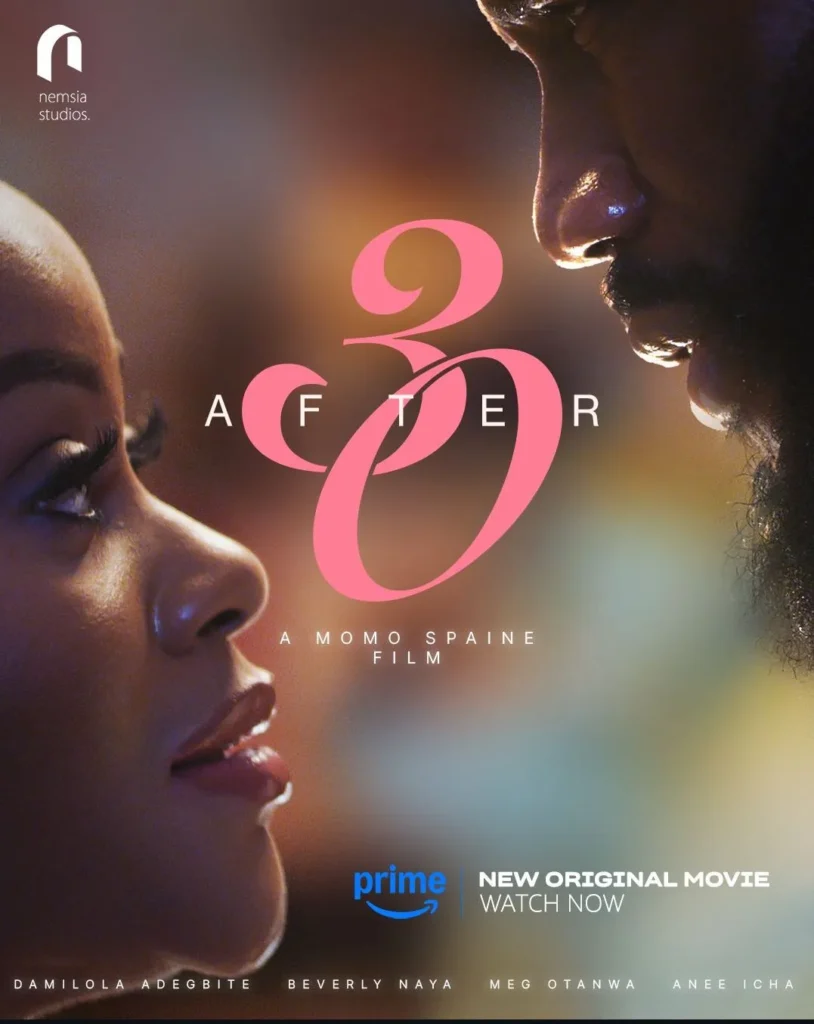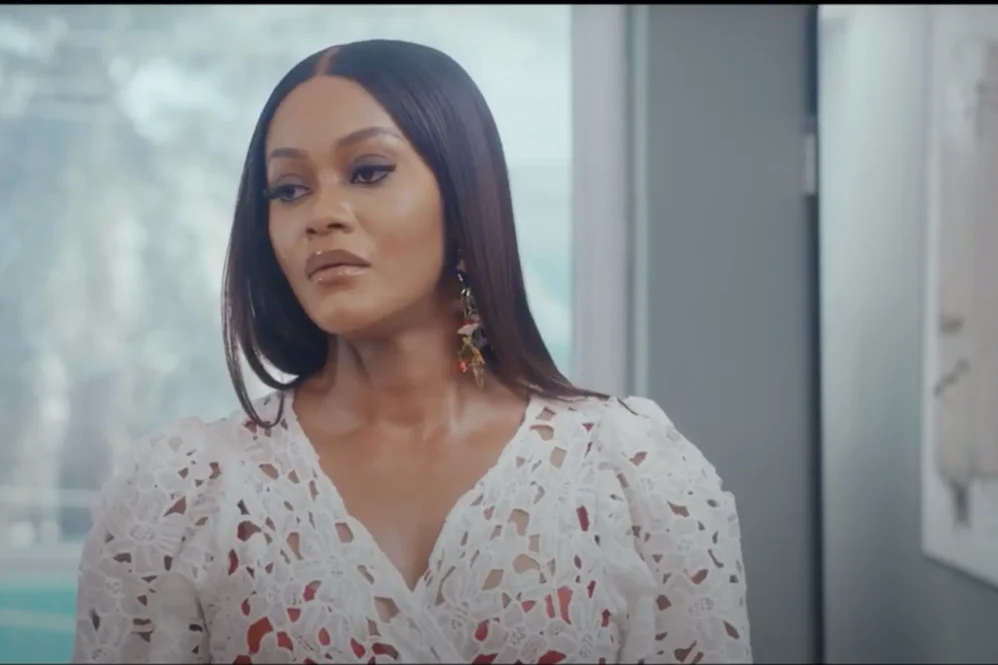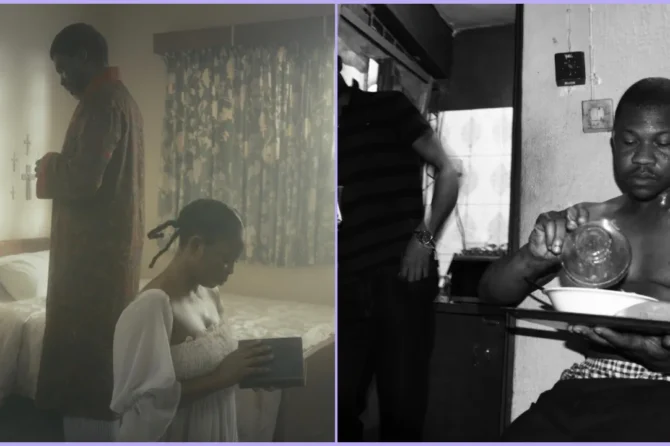In many parts of the world, single women face pressure to marry, often from a young age. Cultural expectations, like a mother critiquing her teenage daughter’s cooking with, “Is this how you’ll make semo in your husband’s house?” frame marriage as something every woman should aspire to, look forward to. The 2015 series Before 30 captured this urgency, following four friends in Lagos and how they deal with these expectations before turning 30, in a city brimming with love and lust. Nearly a decade later, these women return to our screens in a sequel rightly titled After 30. Damilola Adegbite, Beverly Naya, Meg Otanwa, and Anee Icha reprise their roles as Temi, Nkem, Aisha, and Ama—the spirited and ambitious quartet we first fell in love with that year—now navigating life in their 30s with a newfound perspective, no longer racing against the societal clock to settle down.

In After 30, the stakes are more introspective, as we are drawn into the quiet battles and bold dreams that define womanhood beyond societal deadlines. The four friends, now older and perhaps wiser (I’ll leave you to be the judge of that) face challenges that test not only their enduring bond but also their individual senses of self. Set again against the vibrant backdrop of Lagos, the film explores how these women confront their evolving personal aspirations while offering a reflection on the complexities of female friendship in a new chapter of life.
Female friendship has always been a staple trope even in old Nollywood films where they were usually sidelined, often serving as backdrops to romantic or familial drama—think of the gossipy sidekicks or scheming rivals in films like Glamour Girls (1994). These portrayals leaned on stereotypes, with women pitted against each other or relegated to superficial banter. Fast forward to modern Nollywood, and the trope has evolved into a richer, more central narrative force. Films like Isoken (2017), Finding Hubby (2020), and Flawsome (2022) showcase women as complex allies, navigating love, ambition, and societal pressures together.
Although After 30 doesn’t particularly bring anything new that we haven’t seen with the female friendship trope, it pushes this trope further by grounding the women’s friendship in an introspection that seeks to define these women by more than just the effortless chemistry that exists between our charming lead actors. Or their marital aspirations. It’s even less about a bunch of women defying the patriarchal system and refusing to be dependent on men but more about women quietly carving out their truths, exploring their body, their inner longings, hence giving it a more sharper commentary on the female experience than its glossier peers.
Damilola Adegbite as Temi, the high-powered lawyer is still beguiled by Ayo (OC Ukeje) after all these years that she allows him into a love triangle game with the sequel’s newcomer, Kunle (an underused Samuel Asa’ah). Her friends say Ayo is her mumu button and boy are they right? Nkem (Beverly Naya) is successful as an investment banker, but continues her sex-ploration, but only this time with a fierce hunger for motherhood.
Speaking of motherhood, Aisha (Meg Otanwa) is suffocating silently under the weight of societal expectations of a mother and there’s only so much she can give from her well of endurance. Poor Ama (Anee Icha), thanks to a generous inheritance from a wealthy godmother, she could be set for life with freedom to explore her new hobby and maybe give love a shot especially with the introduction of our second major newcomer, Alice (Celestina Aleobua) whose character adds a layer of complexity to Ama’s.
Momo Spaine, as debut director and co-writer of After 30 for Nemsia Studios, ambitiously aims for a high-brow narrative in her first feature, leaning into the vibrant energy of her four female leads to anchor the story. Their undeniable charm and chemistry is as strong as the bond that holds them together, but Spaine struggles to maintain the same cohesion in the storytelling itself. While Before 30 was not without flaws, it retained an earnest appeal. In contrast, After 30 only makes a concerted effort to gloss over the film’s shortcomings without addressing the narrative issues in the film, resulting in a polished makeover of the original series but with a hollow experience nonetheless.
While it doesn’t aspire to be called a feminist work, After 30 interrogates feminist issues that most female-centric titles won’t, especially with how it questions what motherhood is–an aspiration or devotion? In this film, one woman’s aspiration to motherhood shines light on another woman’s devotion to it. Perhaps this is sheer coincidence, or perhaps it is the writers’ deliberate choice to examine this subject by drawing parallels. The screenplay’s exploration of same sex relationships is coy and bold at the same time without falling into the risk of being crudely insensitive or the mindless caricature that other works that manage to approach the topic does.
Bibi Ukpo’s (Princess On A Hill) and BB Sasore’s (Breath of Life) flawed and clumsy writing careens between raunchy good humour, serious drama and few heartwarming moments until the story awkwardly takes a whiplash turn in its final half-hour, where these women are forced to confront difficult truths. The sisterhood is not so indivisible after all, after a TV show and a film of such complex, imperfect but likeable characters. The makers know it’s rare to find a friendship of strong women without its occasional heated conflict. And it gets messier than that in real life.
After 30 premiered at NollywoodWeek Film Festival 2025. It is now streaming on Prime Video.
Side Musings
- How come Temi, who is a brilliant and successful lawyer, was shivering, allowing herself to be intimidated by some lousy police officers? Couldn’t she at least question them or something when they accused her of prostitution or the writing wanted Ayo to step in and save the day? Doesn’t make sense to me.
- This is the second time I’m seeing Meg Otanwa play the role of a mother who went through postpartum depression. First was in For Maria Ebun Pataki. And she does this with so much precision, like it’s a lived experience for her.
- Glass vase for 875,000 naira? How much is the cost of one dress at that store, please?
- Temi’s “acquired” throw-up reflex when she sees two people in love is just her being bitter and cynical about love because she hadn’t found one, if she is honest with herself.
- I will assume that the Bolt driver is new and probably just arrived in the city from a remote village because tell me why a client is telling you to start a new ride and you’re blabbing about being punished by the ride company.
- That opening credit Kabiri Fubara Tribute!. 🥹
- Even Breath of Life made an appearance.
- Meg Otanwa’s polyglot skill coming through. The actress speaks about 6 languages.





Side Musing:
Aisha’s daughter just walking away from her mom, actually side stepping her a little bit is so unnatural. I wish they wrote that scene better. Most kids I’ve observed including my own won’t easily leave their parents, especially when they sense tension, or see their mom upset. Typically and more naturally you’ll need to pry the crying child away from the prying mother, not what they did in that scene. Anyways, you’re right about the whiplash of the last 30 minutes!!! I was like, what just happened?!!